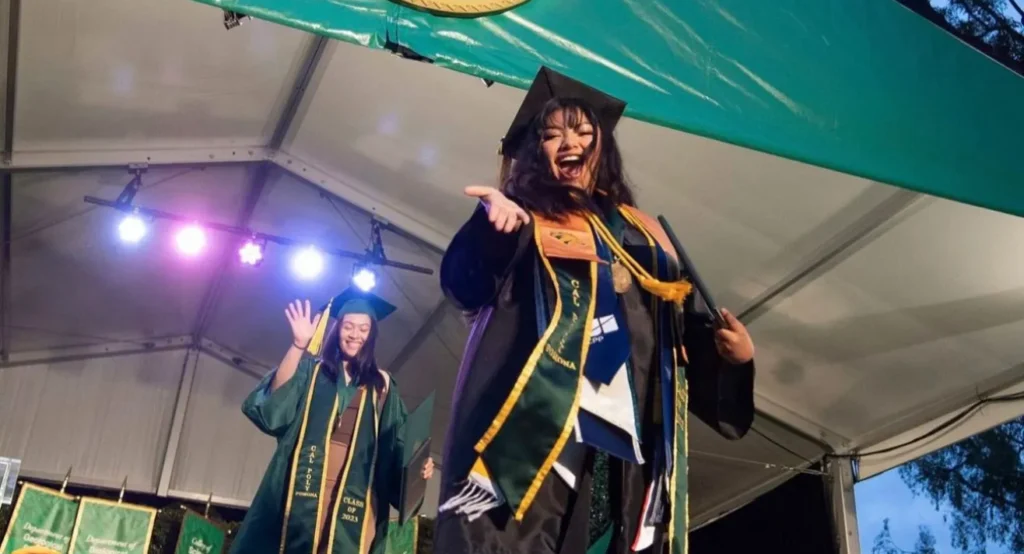The U.S. Supreme Court ruled in June 2023 that Affirmative Action policies in college admissions were unconstitutional.
Over a year later, how has this decision impacted Latino students — a community that is anticipated to suffer the biggest blow?
“Certainly since the elimination of the race factor from college admissions, we’ve seen certain patterns that indicate that especially the most selective universities are not going to accept Latino and African-American students, and this includes UCLA and UC Berkeley, which are considered elite public universities in the nation,” said Doctor Feliza Ortiz Licon, executive vice president of the Campaign for College Opportunity.
Although the University of California president’s office claims that, for the academic year 2024-2025, they admitted the most diverse class overall and that there was a significant increase of Latinos in admissions, the most recent numbers in 2023 indicate that at the most prestigious campuses like UCLA, only 20% of Latino applicants were admitted; at UC Berkeley, it was 24%.
The numbers are less favorable for the African American community: UCLA admitted only 7% of that group.

“Since we passed an anti-affirmative action law in California, Prop 209, we have started to see less diversity on UCLA and UC Berkeley campuses,” said Licon.
Proposition 209, passed in 1996, banned the consideration of race, ethnicity and sex in state-funded contracts.
Licon added that in 2006, out of 5,000 students accepted at UCLA, only 97 were African American: “With the Court’s ruling, this decline in Latino representation we’re going to start seeing it at a national level. There will be fewer opportunities and resources for minority students.”
She explained that in the last year, Latino students in California have faced further admissions challenges because they did not receive Federal Financial Aid (FAFSA) on time, and the numbers of undocumented immigrants applying for federal assistance through the Dream Act dropped.
“Since President-elect Donald Trump’s campaign focused on the immigrant population, and his threats of deportation, there is less confidence among undocumented students to give information to the government when applying for financial aid,” Licon said.
She noted that California public universities are also accepting more students from abroad as a way to expand budgets: “International students are paying more to get into universities. Various initiatives have been put in place to have diversity among students, but minority students are less likely to get into a selective school like UCLA or UC Berkeley.”
Affirmative action has been a key factor in changing the lives of many Latinos — helping them improve their communities, escape poverty and move towards equity — but the repeal of affirmative action will largely eliminate their chances of getting into an elite university.
This move towards equity is the experience of Licon, who was the first in her family to go to college. The daughter of Mexican immigrants, she grew up in a low-income neighborhood in Long Beach.
“I did my bachelor’s at UCLA, my master’s at UC Berkeley and my doctorate at UC Irvine … Even though I had good grades, my scores were not good on standardized tests because they don’t prepare you. Latinos get ahead because of our Latino and immigrant spirit,” she said.
“We are part of society and we are going to be part of the workforce, so investing in Latino students is an opportunity and an investment. It benefits all of us, and an educated democracy is less dependent on social services and contributes to the economy,” she added. “At the end of the day … Latinos are the future.”

Diana Aguilar, a first-generation student who graduated from California State Polytechnic University at Pomona and is now pursuing a master’s degree at Cal State Fullerton, said affirmative action granted her the opportunity to learn in a diverse environment.
“Not only has it allowed students to have peers just like me, who come from many other places, with parents who didn’t go to college, didn’t even have access to high school but it has helped create an environment that I’ve felt a part of,” said Aguilar,, adding that affirmative action “has also allowed us to have teachers that we can identify with.”
She believes that eliminating affirmative action is going to take away more opportunities for students who come from minority and marginalized communities.
“A lot of times we hear it said that Affirmative Action is unfair. I think it’s incorrect because many times colleges don’t go to recruit students to low-income schools that have a teacher for many students but instead go to higher-income high schools.They don’t take into account the social determinants of Latino students,” she explained.
For that reason, she said, repealing affirmative action is a setback in the fight for equality and fairness in higher education: “Universities and colleges have to look at how they’re going to solve this and what they’re going to do to seek out those students who don’t have those opportunities.”
The University of California Office of the President released over the summer a report that says that in the first admissions cycle after the U.S. Supreme Court struck down Affirmative Action, they have led the way in using a comprehensive admissions review process to comply with Proposition 209 while continuing to increase applications, admissions, enrollment and retention of diverse students.
“We are thrilled that the University of California continues to be a destination of choice for our state’s incredibly accomplished and diverse students,” said Han Mi Yoon-Wu, associate vice provost for Undergraduate Admissions at the University of California.
She added that the University’s holistic admissions process, combined with its campuses’ deliberate work with high schools, community colleges and community-based organizations, has made it possible for the University of California to offer the best undergraduate admissions process in the state.
UC reports that it continues to be a top choice for Latino students, who this year were again the largest demographic group of freshmen admitted to California at 38.6% up from 37.7% last year.
The proportion of admission offers to African Americans increased from 5.6% to 5.9%, up 10% from last year.
Admissions to American Indian students remained stable at 0.6% of admitted students.
The proportion of admission offers to White and Asian American students decreased slightly: that for Whites decreased from 19.1% to 18.3%, and from 34% to 33.2% for Asian Americans.
“These admissions numbers demonstrate the University of California’s commitment to expanding opportunity and access, especially for historically underrepresented groups, who comprise the largest-ever share of first-year students,” said UC President Michael V. Drake.
“We are setting more California students on the path to a college degree and future success, and that translates to positive impact on communities throughout the state,” he adds.
This coverage is made possible through the Ethnic Media Services / AAJC reporting project on diversity after affirmative action.




